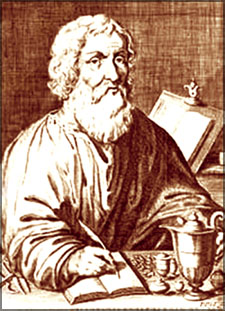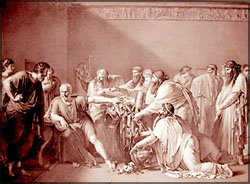|
Hippocrates
The Father of Medicine
 You
may have heard of the Hippocratic Oath taken by doctors as they start on
their medical career. Have you ever wondered why this oath is known as
the Hippocratic Oath? Though the oath taken by today's physicians may
have changed and evolved over the years, the original Oath of Medical
Ethics was developed by Hippocrates. You
may have heard of the Hippocratic Oath taken by doctors as they start on
their medical career. Have you ever wondered why this oath is known as
the Hippocratic Oath? Though the oath taken by today's physicians may
have changed and evolved over the years, the original Oath of Medical
Ethics was developed by Hippocrates.
This Greek physician is considered one of the most outstanding
figures in the history of medicine. He is generally referred to as the 'Father of Medicine' in recognition of his
lasting contributions to the field as the founder of the Hippocratic
school of medicine. He is widely regarded as the greatest physician of
his time.
generally referred to as the 'Father of Medicine' in recognition of his
lasting contributions to the field as the founder of the Hippocratic
school of medicine. He is widely regarded as the greatest physician of
his time.
Hippocrates was born in 460BC on the island of Cos (Kos) in Greece.
His father was said to be Heraclides, a physician, while his mother was
Praxitela. He learned medicine from his father and grandfather, and is
believed to have been trained by other well-known physicians and became
a famous physician and a teacher of medicine.
He had two sons, Thessalus and Draco, who along with his son-in-law,
Polybus, were his students.
He founded the Hippocratic school of medicine in Cos, which
revolutionised medicine in ancient Greece, establishing it as a
discipline different from other fields that it had traditionally been
associated with. He started teaching his ideas at this school although
he also travelled all over Greece practising his medicine.
The Hippocratic Corpus, the collection of works produced by the
Hippocratic school, has contributed to the fame of this great physician.
This collection of around 70 early medical works from ancient Greece is
written in Ionic Greek.
The Hippocratic Oath, the most famous document of the Hippocratic
Corpus, serves as a foundation for other, similar oaths and laws that
define good medical practice and morals.
Hippocrates was the first physician to reject superstitions and
beliefs that attributed illnesses to supernatural or divine forces. He
separated the discipline of medicine from philosophy and religion,
arguing that disease was not a punishment inflicted by the gods, but
rather the product of environmental factors, diet and living habits.
Mystical illnesses are not mentioned anywhere in the Hippocratic Corpus.
He believed that illness had a physical and rational explanation, and
rejected contradictory (opposing) views of his time. Hippocrates based
his medical practice on observations and on the study of the human body.
|

A scene depicting Hippoctrates ( seated on left) |
He took careful, regular notes of symptoms including complexion,
pulse, fever, pains and movement and is said to have measured a
patient's pulse when taking a case history to know if the patient lied.
He also extended clinical observations into family history and
environment.
His school achieved success by applying general diagnoses and passive
treatments, while focusing on patient care and prognosis (forecast about
the course of a disease). It could effectively treat diseases, which
marked a great development in clinical practices.
The Hippocratic bench and other devices were used in his work.
The healing power of nature was successfully employed by this great
physician in the course of his practice. Hippocratic medicine was
thought to have been very kind to the patient; with treatment being
gentle, and the emphasis being on keeping the patient clean and
disinfected.
The work of Hippocrates was notable for its strict professionalism,
discipline and rigorous (demanding) practice. He was also the first to
describe clubbing of the fingers, an important diagnostic sign in
chronic lung disease, lung cancer and heart disease. Due to this reason,
clubbed fingers are also known as 'Hippocratic fingers'.
Hippocrates also categorised illnesses as acute(severe), chronic
(serious), endemic (regularly occuring) and epidemic (prevalant and
spreading rapidly). His teachings are still important to present-day
students of pulmonary (of the lungs) medicine and surgery.
He was also the first documented chest surgeon.
Hippocrates taught and practised medicine throughout his life,
travelling far and wide in Greece. He is thought to have died in Larissa
around 370BC at the age of 83 or 90, though some say he lived to be well
over 100.
The findings and teachings of Hippocrates revolutionised the world of
medicine. They were so revered (venerated) that they were considered too
great to be improved upon and no significant advancements of his methods
were made for a long time.
After the European Renaissance, his methods were revived in Europe
and were further expanded in the 19th century. Hippocrates had been
portrayed as a "kind, dignified, old country doctor'" and as "stern and
forbidding". He was considered to be very wise, of great intellect and
very practical. He had been described as "strictly the physician of
experience and common sense". |
